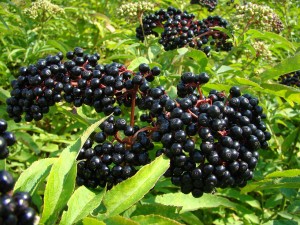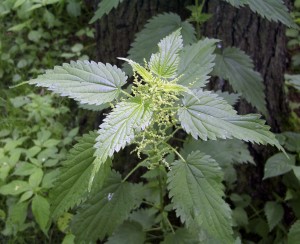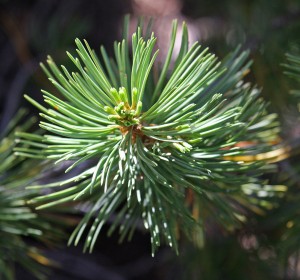Oh November. A time of diminishing sunlight, falling leaves, and increasing susceptibility to the common cold and flu. As we move into late autumn, it’s a good time to think about ways to support your immune system. I always start by reflecting on my diet, and shifting towards cooking and eating more nutritious soups and stews. In addition, I’m naturally drawn to more meditation and mindful movement practices this time of year. And finally, the end of autumn is a great time to incorporate some herbal supplements.
Today, I will introduce three common herbs that are excellent supports for winter health. They are fairly easy to find at places like health food stores or co-ops, and are low in possible side effects.
Elderberry (Sambucus Nigra)
 Elderberry is a well loved folk remedy in many parts of the world. The trees were considered sacred in Europe, and numerous customs were developed around them, including a belief in Serbia that including Elder twigs in a wedding would bring the new couple good luck. Elderberries contain amino acids, carotenoids, flavonoids, vitamin A and B, as well as a large amount of vitamin C. High in antioxident activity, they support the immune system, and also are anti-inflammatory.
Elderberry is a well loved folk remedy in many parts of the world. The trees were considered sacred in Europe, and numerous customs were developed around them, including a belief in Serbia that including Elder twigs in a wedding would bring the new couple good luck. Elderberries contain amino acids, carotenoids, flavonoids, vitamin A and B, as well as a large amount of vitamin C. High in antioxident activity, they support the immune system, and also are anti-inflammatory.
Nettle (Urtica Dioica)
 Many know Nettle as that common weed that stings if you touch it. Because of this, it’s not exactly the most beloved plant in the world. However, Nettle is a powerhouse, and deserves more love than most of us give it. In addition to its many healthful qualities, Nettle is also loaded with nutritional benefits. It’s high in calcium, manganese, Vitamin K, and Vitamin A. Nettle also has significant levels of protein for a leafy plant. Some common uses include a mouth wash, tonic support for the bladder, urinary tract, and endocrine system, and also for easing pain, congestion, and inflammations.
Many know Nettle as that common weed that stings if you touch it. Because of this, it’s not exactly the most beloved plant in the world. However, Nettle is a powerhouse, and deserves more love than most of us give it. In addition to its many healthful qualities, Nettle is also loaded with nutritional benefits. It’s high in calcium, manganese, Vitamin K, and Vitamin A. Nettle also has significant levels of protein for a leafy plant. Some common uses include a mouth wash, tonic support for the bladder, urinary tract, and endocrine system, and also for easing pain, congestion, and inflammations.
Pine Needle (Pinus)
 The great Pine tree, standing tall and majestic. Not technically a “herb,” but still this tree is full of healing qualities. The needles in particular are rich in Vitamins, especially Vitamins A and C. They are commonly used for colds, coughs, immune system support, and easing congestion. More generally, Pine Needles are also anti-inflammatory and supportive of the heart and eyes. If you live in an area where pines are common, you can pick your own needles and make a fresh tea out of them. Many Spruce tree needles have similar qualities, and can be used interchangeably.
The great Pine tree, standing tall and majestic. Not technically a “herb,” but still this tree is full of healing qualities. The needles in particular are rich in Vitamins, especially Vitamins A and C. They are commonly used for colds, coughs, immune system support, and easing congestion. More generally, Pine Needles are also anti-inflammatory and supportive of the heart and eyes. If you live in an area where pines are common, you can pick your own needles and make a fresh tea out of them. Many Spruce tree needles have similar qualities, and can be used interchangeably.
I hope this brief introduction inspires you to do more research, and to, if you haven’t already, consider incorporating herbs into your overall plan for health and well being.
Photo Credits
Elderberry (Sambucus Nigra) – Wikimedia Creative Commons
Nettle (Urtica Dioica) – Wikimedia Creative Commons
Pine Needle (Pinus) – Wikimedia Creative Commons


Please Share Your Thoughts - Leave A Comment!